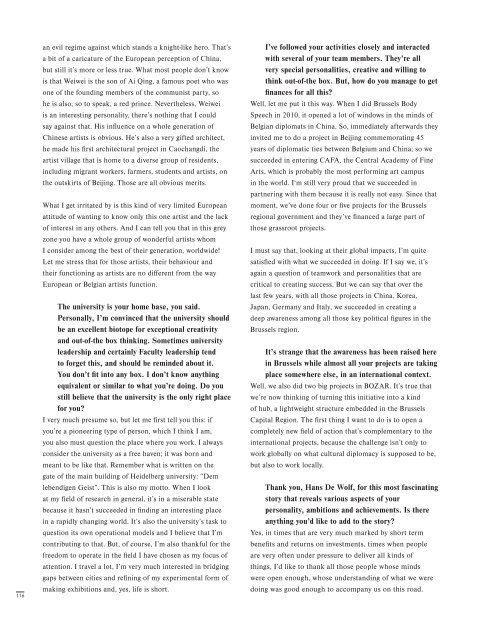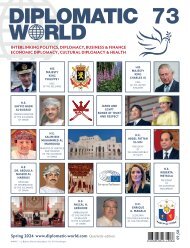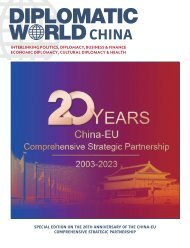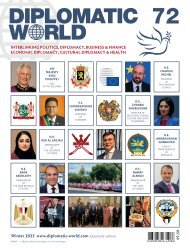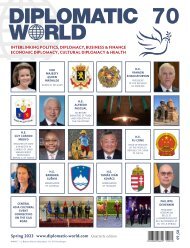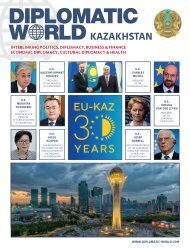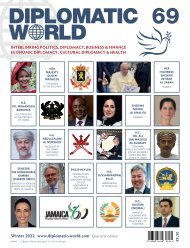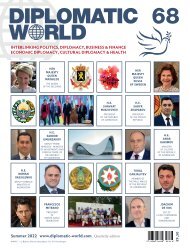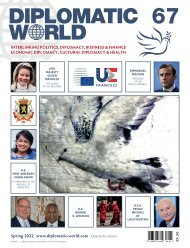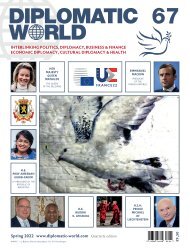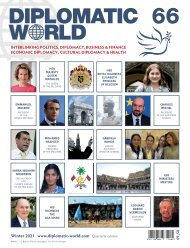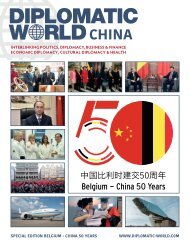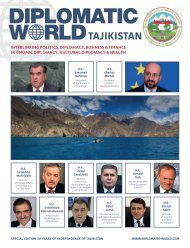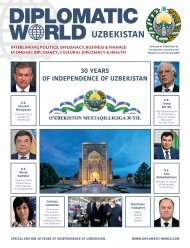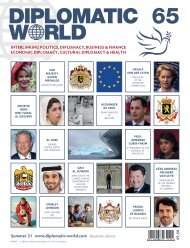Create successful ePaper yourself
Turn your PDF publications into a flip-book with our unique Google optimized e-Paper software.
116<br />
an evil regime against which stands a knight-like hero. That’s<br />
a bit of a caricature of the European perception of China,<br />
but still it’s more or less true. What most people don’t know<br />
is that Weiwei is the son of Ai Qing, a famous poet who was<br />
one of the founding members of the communist party, so<br />
he is also, so to speak, a red prince. Nevertheless, Weiwei<br />
is an interesting personality, there’s nothing that I could<br />
say against that. His influence on a whole generation of<br />
Chinese artists is obvious. He’s also a very gifted architect,<br />
he made his first architectural project in Caochangdi, the<br />
artist village that is home to a diverse group of residents,<br />
including migrant workers, farmers, students and artists, on<br />
the outskirts of Beijing. Those are all obvious merits.<br />
What I get irritated by is this kind of very limited European<br />
attitude of wanting to know only this one artist and the lack<br />
of interest in any others. And I can tell you that in this grey<br />
zone you have a whole group of wonderful artists whom<br />
I consider among the best of their generation, worldwide!<br />
Let me stress that for those artists, their behaviour and<br />
their functioning as artists are no different from the way<br />
European or Belgian artists function.<br />
The university is your home base, you said.<br />
Personally, I’m convinced that the university should<br />
be an excellent biotope for exceptional creativity<br />
and out-of-the box thinking. Sometimes university<br />
leadership and certainly Faculty leadership tend<br />
to forget this, and should be reminded about it.<br />
You don’t fit into any box. I don’t know anything<br />
equivalent or similar to what you’re doing. Do you<br />
still believe that the university is the only right place<br />
for you?<br />
I very much presume so, but let me first tell you this: if<br />
you’re a pioneering type of person, which I think I am,<br />
you also must question the place where you work. I always<br />
consider the university as a free haven; it was born and<br />
meant to be like that. Remember what is written on the<br />
gate of the main building of Heidelberg university: “Dem<br />
lebendigen Geist”. This is also my motto. When I look<br />
at my field of research in general, it’s in a miserable state<br />
because it hasn’t succeeded in finding an interesting place<br />
in a rapidly changing world. It’s also the university’s task to<br />
question its own operational models and I believe that I’m<br />
contributing to that. But, of course, I’m also thankful for the<br />
freedom to operate in the field I have chosen as my focus of<br />
attention. I travel a lot, I’m very much interested in bridging<br />
gaps between cities and refining of my experimental form of<br />
making exhibitions and, yes, life is short.<br />
I’ve followed your activities closely and interacted<br />
with several of your team members. They’re all<br />
very special personalities, creative and willing to<br />
think out-of-the box. But, how do you manage to get<br />
finances for all this?<br />
Well, let me put it this way. When I did Brussels Body<br />
Speech in 2010, it opened a lot of windows in the minds of<br />
Belgian diplomats in China. So, immediately afterwards they<br />
invited me to do a project in Beijing commemorating 45<br />
years of diplomatic ties between Belgium and China; so we<br />
succeeded in entering CAFA, the Central Academy of Fine<br />
Arts, which is probably the most performing art campus<br />
in the world. I‘m still very proud that we succeeded in<br />
partnering with them because it is really not easy. Since that<br />
moment, we’ve done four or five projects for the Brussels<br />
regional government and they’ve financed a large part of<br />
those grassroot projects.<br />
I must say that, looking at their global impacts, I’m quite<br />
satisfied with what we succeeded in doing. If I say we, it’s<br />
again a question of teamwork and personalities that are<br />
critical to creating success. But we can say that over the<br />
last few years, with all those projects in China, Korea,<br />
Japan, Germany and Italy, we succeeded in creating a<br />
deep awareness among all those key political figures in the<br />
Brussels region.<br />
It’s strange that the awareness has been raised here<br />
in Brussels while almost all your projects are taking<br />
place somewhere else, in an international context.<br />
Well, we also did two big projects in BOZAR. It’s true that<br />
we’re now thinking of turning this initiative into a kind<br />
of hub, a lightweight structure embedded in the Brussels<br />
Capital Region. The first thing I want to do is to open a<br />
completely new field of action that’s complementary to the<br />
international projects, because the challenge isn’t only to<br />
work globally on what cultural diplomacy is supposed to be,<br />
but also to work locally.<br />
Thank you, Hans De Wolf, for this most fascinating<br />
story that reveals various aspects of your<br />
personality, ambitions and achievements. Is there<br />
anything you’d like to add to the story?<br />
Yes, in times that are very much marked by short term<br />
benefits and returns on investments, times when people<br />
are very often under pressure to deliver all kinds of<br />
things, I’d like to thank all those people whose minds<br />
were open enough, whose understanding of what we were<br />
doing was good enough to accompany us on this road.


